Background
David Malet Armstrong was born on July 8, 1926, in Melbourne, Australia. He was a son of John Malet Armstrong and Phillipa Suzanne (Marett) Armstrong. He also had a brother and a sister.

50 Biddlecombe Ave, Corio VIC 3214, Australia
Geelong Grammar School where David Malet Armstrong studied.
Camperdown NSW 2006, Australia
The University of Sydney where David Malet Armstrong studied.
Oxford OX1 2JD, United Kingdom
The University of Oxford where David Malet Armstrong received a Bachelor of Philosophy degree.
Parkville VIC 3010, Australia
The University of Melbourne where David Malet Armstrong received a Doctor of Philosophy degree.
Kenneth Gee and Professor David Armstrong, pictured at a press conference for The Friends Of Vietnam at the Rex Carlton Hotel, Sydney on 31 January 1973.
Nottingham NG7 2RD, United Kingdom
David Armstrong receiving his doctorate of letters at Nottingham University on 13 December 2007.
Bardwell Rd, Oxford OX2 6SS, United Kingdom
The Dragon School where David Armstrong studied.
The Centenary Medal that David Armstrong received in 2001.
The Officer of the Order of Australia that David Armstrong received in 1993.
Challis Chair of Philosophy at Sydney University, Professor David Armstrong, pictured at his Glebe home on 18 December 1991.
Portrait of David Armstrong by Clifford Pugh.












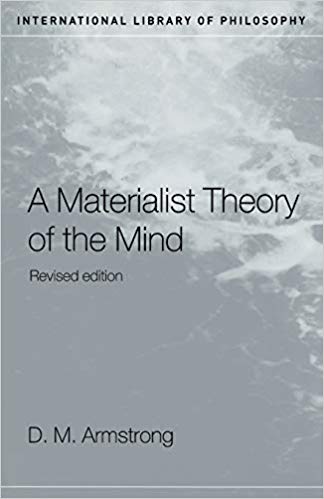
(Breaking new ground in the debate about the relation of m...)
Breaking new ground in the debate about the relation of mind and body, David Armstrong's classic text – first published in 1968 – remains the most compelling and comprehensive statement of the view that the mind is material or physical. In the preface to this new edition, the author reflects on the book's impact and considers it in the light of subsequent developments. He also provides a bibliography of all the key writings to have appeared in the materialist debate.
https://www.amazon.com/Materialist-Theory-International-Library-Philosophy/dp/0415100313
1968

(A wide-ranging study of the central concepts in epistemol...)
A wide-ranging study of the central concepts in epistemology – belief, truth, and knowledge. Professor Armstrong offers a dispositional account of general beliefs and of knowledge of general propositions.
https://www.amazon.com/Belief-Truth-Knowledge-D-Armstrong/dp/0521097371
1973
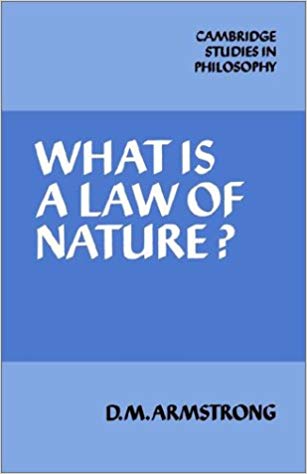
(This is a study of a crucial and controversial topic in m...)
This is a study of a crucial and controversial topic in metaphysics and the philosophy of science: the status of the laws of nature. D. M. Armstrong works out clearly and in comprehensive detail a largely original view that laws are relations between properties or universals. The theory is continuous with the views on universals and more generally with the scientific realism that Professor Armstrong has advanced in earlier publications.
https://www.amazon.com/gp/product/052131481X/ref=dbs_a_def_rwt_bibl_vppi_i0
1983
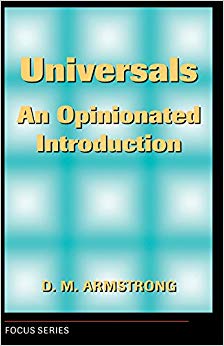
(In this short text, a distinguished philosopher turns his...)
In this short text, a distinguished philosopher turns his attention to one of the oldest and most fundamental philosophical problems of all: How it is that we are able to sort and classify different things as being of the same natural class? Professor Armstrong carefully sets out six major theories, ancient, modern, and contemporary, and assesses the strengths and weaknesses of each.
https://www.amazon.com/gp/product/B07CLKCCD7/ref=dbs_a_def_rwt_bibl_vppi_i3
1989
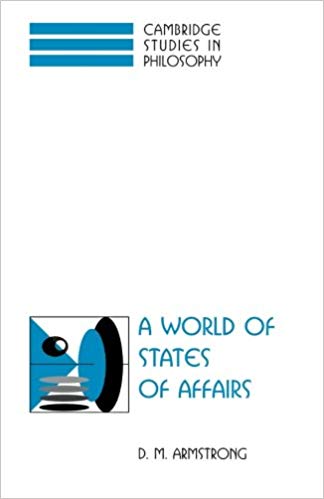
(In this important study D. M. Armstrong offers a comprehe...)
In this important study D. M. Armstrong offers a comprehensive system of analytical metaphysics that synthesizes but also develops his thinking over the past twenty years. Armstrong's analysis, which acknowledges the "logical atomism" of Russell and Wittgenstein, makes facts (or states of affairs, as the author calls them) the fundamental constituents of the world, examining properties, relations, numbers, classes, possibility and necessity, dispositions, causes and laws. It will appeal to a wide readership in analytical philosophy.
https://www.amazon.com/States-Affairs-Cambridge-Studies-Philosophy/dp/0521589487
1997
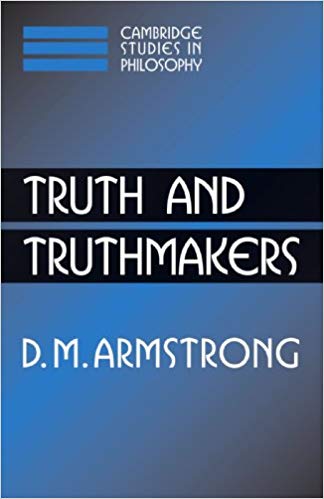
(With many adherents among contemporary philosophers, trut...)
With many adherents among contemporary philosophers, truthmaking theory is the most recent development of a realist theory of truth. D.M. Armstrong offers the first full-length study of this theory and makes a compelling case for truthmaking's importance in philosophy. His book marks a significant contribution to the debate and will be of interest to a wide range of readers working in analytical philosophy.
https://www.amazon.com/gp/product/0521547237/ref=dbs_a_def_rwt_bibl_vppi_i7
2004

(David Armstrong sets out his metaphysical system in a set...)
David Armstrong sets out his metaphysical system in a set of concise and lively chapters each dealing with one aspect of the world. He begins with the assumption that all that exists is the physical world of space-time. On this foundation he constructs a coherent metaphysical scheme that gives plausible answers to many of the great problems of metaphysics. He gives accounts of properties, relations, and particulars; laws of nature; modality; abstract objects such as numbers; and time and mind.
https://www.amazon.com/Sketch-Systematic-Metaphysics-D-Armstrong-dp-0199590613/dp/0199590613/ref=mt_hardcover?_encoding=UTF8&me=&qid=
2010
David Malet Armstrong was born on July 8, 1926, in Melbourne, Australia. He was a son of John Malet Armstrong and Phillipa Suzanne (Marett) Armstrong. He also had a brother and a sister.
David Malet Armstrong attended Dragon School and Geelong Grammar School. He interrupted his studies to join the Royal Australian Navy in 1946. Later he studied at the University of Sydney from 1947 to 1950 where he received a Bachelor of Arts degree in Philosophy, with University Medal. In 1952 he entered the University of Oxford where he received a Bachelor of Philosophy degree in 1954. Armstrong also attended the University of Melbourne and received a Doctor of Philosophy degree in 1960.
David Malet Armstrong received an Honorary Doctor of Letters degree from the University of Nottingham in 2007.
David Armstrong started his career as an assistant lecturer at Birkbeck College in 1954. He held this post until 1955 and in 1956 he took up a post of a lecturer at the University of Melbourne. In 1963, Armstrong left the University of Melbourne and became a Challis Professor of Philosophy at the University of Sydney in 1964. He held this post until his retirement in 1991. Armstrong also served as a visiting professor at Yale University, Stanford University, University of Notre Dame and the University of California at Irvine.
David Armstrong published his first book Berkeley's Theory of Vision in 1960. Later he wrote such books as A Materialist Theory of the Mind, Belief, Truth and Knowledge, A World of States of Affairs, Truth and Truthmakers and Sketch for a Systematic Metaphysics. Armstrong was also for many years a member of the editorial board of, and contributor to, Quadrant magazine, the main publication of the AACF.
David Malet Armstrong was an Australian philosopher, educator, and writer who was famous for his books about metaphysics and the philosophy of mind. His most famous books are A Materialist Theory of the Mind, What is a Law of Nature? and Truth and Truthmakers. Armstrong is also famous as the developer of the theory that is known as "the identity theory of mind".
David Armstrong received the Officer of the Order of Australia in 1993, for services to Philosophy. In 2001, he was awarded the Centenary Medal.
(In this short text, a distinguished philosopher turns his...)
1989(Breaking new ground in the debate about the relation of m...)
1968(This is a study of a crucial and controversial topic in m...)
1983(With many adherents among contemporary philosophers, trut...)
2004(David Armstrong sets out his metaphysical system in a set...)
2010(A wide-ranging study of the central concepts in epistemol...)
1973(In this important study D. M. Armstrong offers a comprehe...)
1997David Malet Armstrong held conservative political and social views that distinguished him from many of his academic colleagues.
Armstrong’s philosophy can be divided into three main, though overlapping, areas: his early work on perception and sensation. A middle period on the mind, consciousness, intentionality, belief and knowledge, abandoning his early behaviorism. And a later interest in universals, branching off into laws of nature and the study of possibility.
Above all Aron sought to defend the value of freedom and to preserve the irreducible subjectivity of human experience and the open-endedness of history from sociological and historical determinism. Aron's prewar concerns were with epistemological and formal problems in sociological thought and the philosophy of history. After the war, his work had a different orientation, addressing the immediate concrete political, economic, social and international problems of twentieth-century life. He also derived the mind-brain identity theory from a view about the distinctive roles played by mental states, combined with a view about what kinds of states – namely brain states – play those roles.
He rejected Quine's doctrine that only subjects carry ontological commitment. He treats laws of nature as relations of non-logical necessity between universals, known empirically. The 1977 article offers a good summary of much of his later philosophy. Armstrong’s attack on nominalism has perhaps been more controversial than those on representationalism and phenomenalism but, apart from his general materialism, particularly controversial was his early claim that perception is nothing but the acquiring of knowledge or an inclination to believe.
Quotations:
"To accept Naturalism is to reject such entities as Cartesian minds, private visual and tactual spaces, angelic beings and God."
"If students are intimidated, they just won't fill out the form. This is especially true in families where no one has previously attended college."
"The concept of a mental state is primarily the concept of a state of the person apt for bringing about a certain sort of behavior."
David Malet Armstrong was a member of the American Academy of Arts and Sciences and the Australian Academy of the Humanities.
Quotes from others about the person
Keith Campbell: "Armstrong's contributions to metaphysics and epistemology helped to shape philosophy's agenda and terms of debate, and his work always concerned to elaborate and defend a philosophy which is optically economical, synoptic, and compatibly continuous with established results in the natural sciences."
David Malet Armstrong married Madeleine Annette Hayden in 1950. Later David and Madeleine divorced. In 1982, Armstrong married Jennifer Mary de Bohun Clark.
